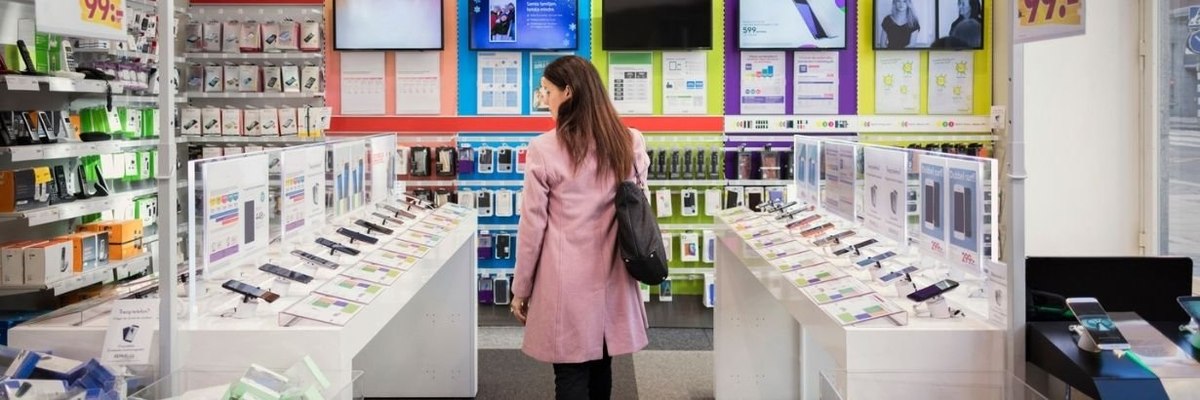Brick-and-mortar retail stores have had a bad pandemic: in many nations, they’ve been closed outright for months at a time, and even in those where they have remained open, the threat of the virus has reduced incentives to shop in physical locations.
Global YouGov data shows that, for many consumers, the ability to trial products and services in the flesh is a key motivator. In every one of the 17 nations featured in our study, a majority of the public say experiencing products in-person is a key reason to shop in a brick-and-mortar store. This is at its highest in Mexico, where 7 in 10 consumers say this influences their reasons to shop at these stores (71%) – and even in France, where this tendency lowest, half of consumers (51%) say the same.
A significant proportion of global consumers also appreciate the speed and simplicity of an in-store buy. In Mexico (52%), Australia (52%), Spain (50%), and the US (50%), at least half of the public feel this way; German consumers, a quarter of whom (26%) say the pace of their purchase influences their decisions to use brick-and-mortar channels, are an outlier.
There’s also evidence that the brick-and-mortar shopping experience is something a significant proportion of consumers value in and of itself. Approaching half of consumers in Hong Kong say that going to a retail store is a key motivation (46%), with nearly a quarter of Polish consumers saying the same at the other end of the scale (23%). There isn’t necessarily neat alignment from region to region. While Scandinavian nations might say that being able to try things in store is a key motivator (Denmark 64%; Sweden 63%), APAC nations are all over the scale: while three in five Australians (60%) and Indonesians (59%) say the same, this falls to two in five consumers in India (39%) and China (35%).
Similarly, European nations can be found at the top (Britain 42%; Germany 38%) in terms of whether the in-store experience is a key motivator, but also at the bottom (France 29%; Poland 23%). In Australia (40%) and Spain (36%), a product return policy is a key part of a brick-and-mortar chain’s appeal; in Italy (20%) and Hong Kong (19%), it plays a much smaller role.
Barriers to buying through brick-and-mortar channels
So what stops consumers from buying through brick and mortar channels? As with the motivators, it varies heavily from market to market, although there are some regional commonalities. A lack of suitable offers and discounts, for example, is cited as a key barrier for consumers in most of the APAC countries in our survey: approaching half of the public in Indonesia (52%), India (47%), Singapore (46%), and China (45%) say it stops them shopping in physical stores. It’s less of a barrier in Scandinavia (Denmark 17%; Sweden 19%) and the US (21%). Offering more rewards for consumers who pop into the shop may nonetheless pay off in certain markets.
COVID has also played a significant role: a desire to adhere to social distancing guidelines or avoid public interactions has been an obstacle for between half (Great Britain: 48%), and a quarter (Poland: 25%) of consumers. As the global vaccine rollout continues and normality reasserts itself, this should be less of a barrier for consumers – again, in each market, a majority of consumers prefer experiencing products in-store.
Although looking at our list of barriers reveals they may also have an ambivalent relationship with it, particularly in the APAC region. Singapore (46%), China (43%), Hong Kong (39%) and Australia (33%) make up four of the top five countries where the public cite the inconvenience of going to a physical store as a problem when using brick-and-mortar channels.
This feeling may be exacerbated among the small – but often significant – group of consumers who say accessibility is a reason to avoid brick-and-mortar channels. In Singapore, this rises to as many as three in ten consumers (30%), and a fifth of consumers in India (22%), Mexico (22%), Poland (22%), Indonesia (19%), the UAE (19%), and Denmark (18%). On a related note, three in ten Australian (31%), Mexican (30%) Spanish (30%), Swedish (30%) Indian (29%) and Emirati (29%) consumers claim parking is a problem when it comes to physical retail. Improving ease of access for the public may not seem like a major sales driver, but it could make a difference to an important subset of the global population.
Receive monthly topical insights about the retail industry, straight to your inbox. Sign up today.
Discover more retail content here









